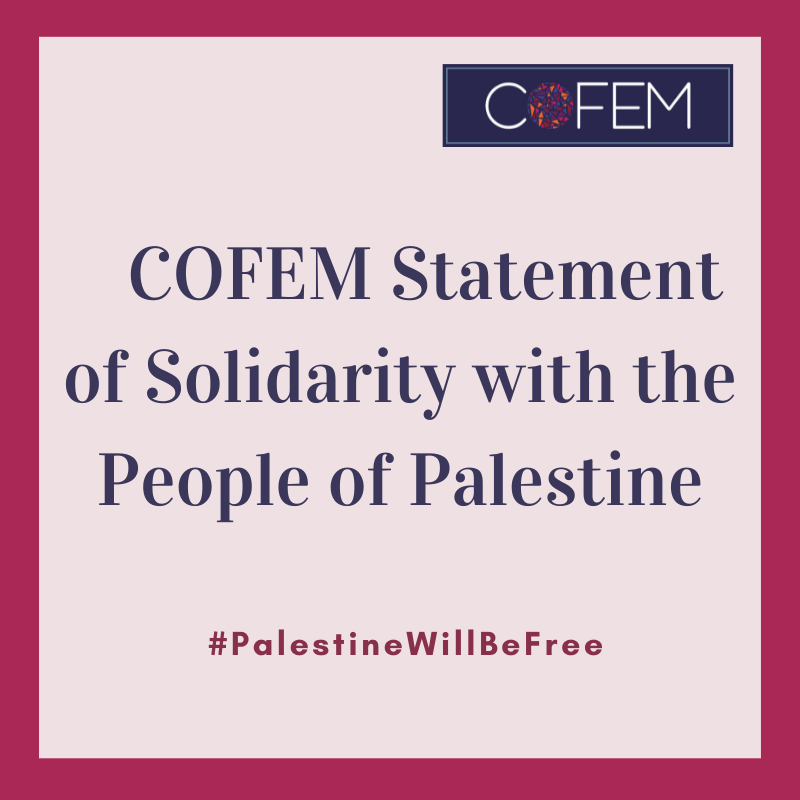The Coalition of Feminists for Social Change stands in unwavering solidarity with the people of Palestine, firmly condemning the 75-year-long illegal occupation of Palestinian territories and the 16-year blockade on Gaza. The ongoing violence gravely infringes upon the fundamental human rights of the Palestinian population. We stand shoulder-to-shoulder with Palestinian feminist and community-based organizations who demonstrate unwavering resilience on the front lines, providing crucial support to their communities.
As Politics4Her reminds us, our unwavering commitment to the protection of women in conflict zones knows no borders. We firmly uphold the intrinsic importance of preserving women’s rights, safety, and dignity across all regions. Upon careful analysis, we unearth a disturbing reality: documented instances of sexual violence and gender-based violence against Palestinian women by the Israeli Occupation Forces. These findings are corroborated by studies and reports from numerous reputable international organizations, such as “Violence against Palestinian women” by The World Organization Against Torture and the Public Committee Against Torture in Israel.
COFEM acknowledges the escalation of violence against women and girls during times of conflict and occupation. We call upon the international community to adopt a feminist perspective when monitoring and responding to the crisis in Palestine. This approach centers the voices and diverse needs of women and girls, ensuring their full participation in peace and humanitarian response efforts. In the face of this occupation, it is not just advisable but ethically imperative to value every life, regardless of race, culture, or nationality, and to create equal opportunities for safety, security, and dignified lives for all Palestinians. It is essential to recognize the historical context and current disregard for the plight of Palestinians and resist the narrow, Western-centric lens that often characterizes this crisis. Additionally, for those governments that have committed to feminist foreign policies, as noted by Feminists in Kenya, “we remind them that a true feminist foreign policy is inherently anti-imperialist and prioritizes the demilitarization and de-escalation of war”.
As a global feminist collective, we stand in solidarity with the millions of women in the region and across the world in vehemently rejecting any stigmatization or skepticism of this resistance. We recognize it as an unwavering anticolonial liberation struggle, one that can only reach its fruition with the liberation and restoration of the historical land of Palestine and the emancipation of all bodies oppressed under the yoke of Western settler colonialism in Palestine, both militarily and structurally.
We strongly denounce antisemitism, racism, and Islamophobia in all forms, and we critically scrutinize institutions, countries, media, technology companies, and other entities that perpetuate inequitable policies and discriminatory practices. Dismantling structural racism is an urgent necessity, safeguarding the dignity and freedom of all Palestinians. We stand in solidarity with the resilient spirit of minoritized populations in their relentless pursuit of their rights.
Recognizing the interlinked nature of our collective struggles, we firmly believe that each of us can contribute as allies, advocates, and in unified solidarity. We also recognize Jewish people globally who have advocated for the end of Israel’s occupation of Palestine. Extending empathy and compassion to the Palestinian people, families, and communities grappling with ethnic cleansing, occupation, and genocide is paramount.
We implore humanitarian and international actors to prioritize Palestinian grassroots feminist and rights-based organizations, starting with swift and feminist-oriented response funding. Financial support during this critical period must adhere to the core principles of feminist grantmaking, directing aid toward women and girls, supporting feminist organizations addressing multiple forms of oppression, offering flexible funding without bureaucratic burdens, and advocating within donor governments and organizations for enduring, sustained support. For more information, please see COFEM’s Handbook on Feminist Grantmaking.
As we stand in solidarity with the Palestinian people, it is crucial to recognize the profound historical context of their resistance. Decades of non-violent activism precede their current struggle, tragically following years of unheeded calls for justice. The world has become increasingly aware of the crimes against humanity, ethnic cleansing and apartheid that have plagued the Palestinian population, despite initial resistance to this characterization. The intensification of violence against Palestinians cannot be ignored.
How can the international feminist community be of best support and in solidarity with the people of Palestine?
Immediately:
- Reach out to your legislators to discuss the urgent need for a ceasefire.
- Join protests and advocacy efforts in your city to raise awareness about the illegal occupation of Palestine and the rights of the Palestinian people.
- Directly donate to Palestinian community-based feminist and mutual aid organizations. They are best positioned to understand the evolving needs of their communities. Resourcing can also be directed to the following organizations:
Over the long-term:
- Support advocacy around opening up borders for immediate humanitarian access.
- Send humanitarian aid to Palestine to support those affected by the ongoing crisis.
